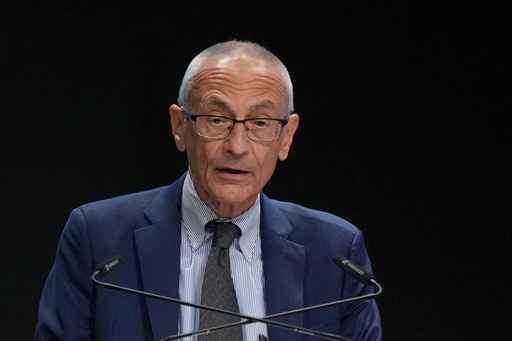Biden climate adviser says California wildfires show ‘you have to take the science seriously’

FILE - John Podesta, U.S. climate envoy, speaks during a plenary session at the COP29 U.N. Climate Summit, Nov. 13, 2024, in Baku, Azerbaijan. (AP Photo/Sergei Grits, File)[ASSOCIATED PRESS/Sergei Grits]
WASHINGTON (AP) — The massive wildfires that have killed 10 people in the Los Angeles area and caused billions of dollars in property damage are the latest sign of the growing threat posed by climate change — one that President-elect Donald Trump will have to take more seriously than he did in his first term, a top adviser to President Joe Biden said.
John Podesta, Biden’s senior adviser for international climate policy, said one of the iconic images of Trump’s first term showed him tossing paper towels to people in Puerto Rico who had been been ravaged by a hurricane. Many critics called Trump’s action disrespectful, especially after he disputed a death count from Hurricane Maria that reached nearly 3,000 people.
“You would think hopefully he would have learned from the public’s reaction to that — that you have to take the science seriously. You have to take the facts seriously. You have to take the threat seriously,” Podesta said in an interview with The Associated Press.
As the unfolding disaster in California demonstrates, “these challenges from extreme weather events that are induced by climate change are just getting worse and worse,” Podesta said. “I think that, hopefully, the second Trump administration will indeed take this more seriously” than in Trump’s first term.
Trump, a Republican, has not been offering much sympathy as the wildfires rage. Instead, he claimed this week that he could do a better job managing the crisis, casting blame on California’s Democratic governor.
Trump has criticized his longtime political foe Gov. Gavin Newsom’s forest management policies and falsely claimed the state’s fish conservation efforts are responsible for fire hydrants running dry in urban areas.
Trump and his transition team have signaled that they will seek to reverse many of the mitigation actions the Biden administration has taken to reduce planet-warming greenhouse gas emissions, including tighter pollution standards for power plants and cars and trucks. But Podesta suggested that when it comes to climate resilience — including hardening infrastructure to make it more resistant to climate change — Trump should listen to scientists and other experts.
“At least when it comes to this question of resilience and adaptation, I think, that is not a liberal or conservative issue. That’s not a red state or blue state issue. It’s happening all across the country,” he said, citing Hurricane Helene, which devastated North Carolina and other states last fall.
“North Carolina was used to hurricane damage, but not in the mountains and not in Asheville,” Podesta said.
Trump and his team “would do well to understand — and listen to the experts in NASA and NOAA — and begin to plan and prepare for what is likely to be, again, an increasing risk across the country from these extreme weather challenges,” he said.
Podesta and Ali Zaidi, Biden’s domestic climate adviser, spoke to the AP as the White House released a report Friday on national adaptation and resilience planning strategy for climate change.
“Across the United States, climate change is accelerating the frequency and fueling the severity of extreme weather events, resulting in tragedies and new realities that once seemed unimaginable,” the report said. The Phoenix area experienced 113 consecutive days of temperatures in excess of 100 degrees Fahrenheit last year, leading to heat emergencies that disrupted schools and businesses, while devastating floods in Iowa and Minnesota forced thousands to evacuate and wiped out roads and rail lines, the report said.
Hurricanes supercharged by warm ocean water ravaged communities in the Southeast, killing hundreds and cutting communities off from power and water, while wildfires in New Mexico, Oregon and California destroyed entire neighborhoods, the report added.
While the nation is moving to address the projected risks and impacts of climate change, there is far more work to do in the years ahead, the report said, urging an “all-hands-on deck effort across all levels of government,” including federal, state, local, Tribal and territorial leaders.
The climate adaptation report, submitted under the framework of the United Nations, reflects the reality that the United States is not exempt from climate damage that has ravaged developing countries and island nations, Zaidi said.
“Development status does not grant any country climate-haven status,” he said. “Just because the U.S. has the biggest, most prosperous economy in the world does not mean climate risk stops at our borders. In our own communities, no place is impervious to this risk. All of us are on the hook to step up in a big way.”
While Trump has pledged to undo many of Biden’s actions on climate change, Podesta and Zaidi were confident that the Democratic president’s signature climate law will continue in the new administration. The Inflation Reduction Act, passed in 2022 with only Democratic support, authorizes about $270 billion for clean energy such as wind and solar power, with many projects located in Republican congressional districts.
“There’s no question that the public supports the buildout of clean power and wants to see that move forward,” Podesta said, adding that many Republican governors are excited about new battery plants, manufacturing jobs and other investments in their states.
“I think they’ll want to try to do what they can to defend those investments and the jobs that go with them,” he said, noting that more than 400,000 jobs have been created as a result of the IRA and Bipartisan Infrastructure Law approved in 2021.
“Walking away from all that would just be, not only bad policy, but really bad politics,” he said.
Copyright 2025 The Associated Press. All rights reserved. This material may not be published, broadcast, rewritten or redistributed without permission.